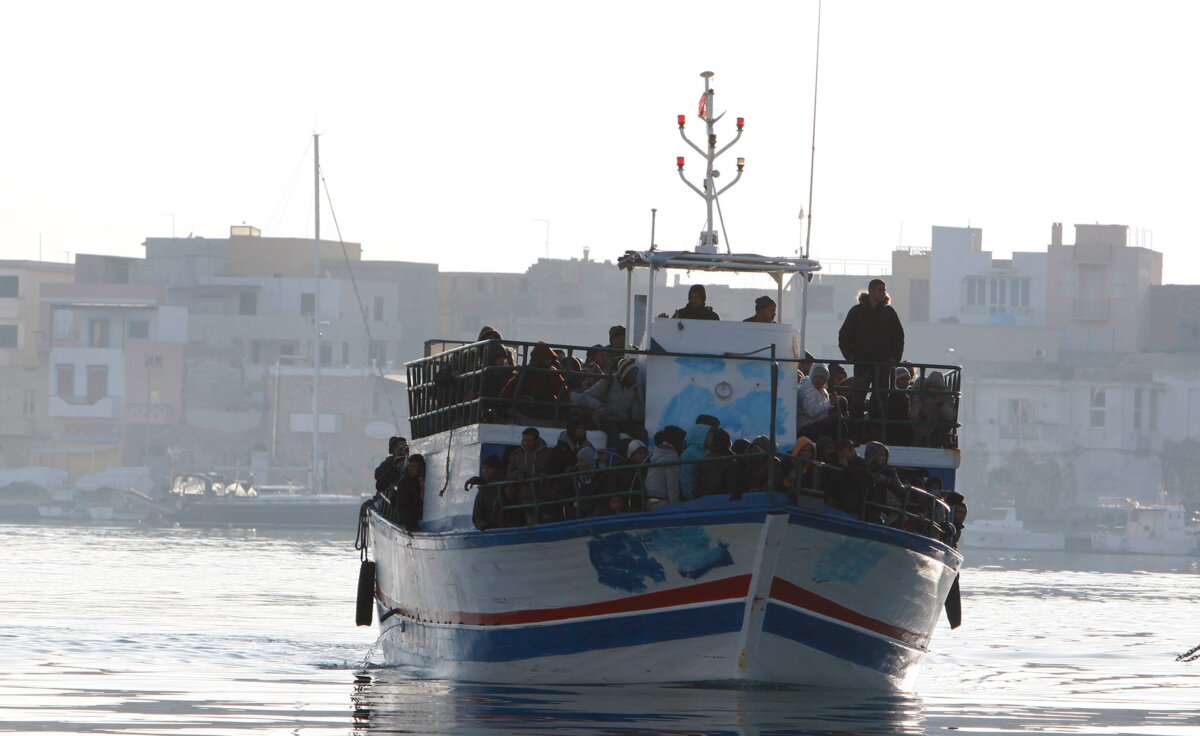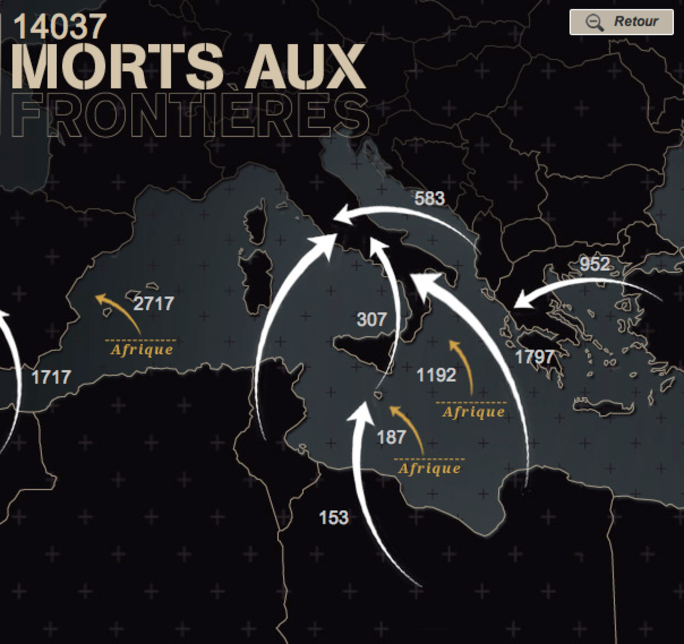Following the arrival this month of thousands of Tunisians on the island of Lampedusa, Italian foreign minister Franco Frattini has warned that the fall of Libyan dictator Muammar Gaddafi will open a migratory exodus of 'biblical proportions'. Here, Carine Fouteau reports on how pro-democracy revolts sweeping away the dictatorial regimes of the Arab world have opened up an embarrassing issue for the European Union, which for years has relied on the despots of North Africa to help control clandestine migration from the continent.
-------------------------
On February15th, the day when the first demonstrations against the regime of Colonel Muammar Gaddafi erupted in Libya, European Union officials in Brussels met with representatives of the Tripoli regime to discuss the putting into place of an agreement reached last October to combat illegal immigration into Europe.
The Libyan interior ministry officials met with members of the EU internal affairs commission, following up on the deal whereby Tripoli, in exchange for EU funding, would crack down on clandestine migrants seeking to reach EU countries from Libya.
The coincidental events colourfully underlined the EU's only concreteresponse so far to the series of popular uprisings in the Maghreb and MiddleEast countries, namely to increase the surveillance of Europe's outer frontiersin an attempt to block an influx of immigrants.
Last Sunday, the European, Warsaw-based border security agency Frontex began coordinating provision for the Italian authorities of increased maritime and aviation resources, along with EU police officials, to help with the policing of its borders. "I am pleased to announce that as of today the Frontex mission ‘Hermes' will officially be deployed to assist the Italian authorities in managing the inflow of migrants from North Africa, particularly arrivals from Tunisia, on the island of Lampedusa," announced EU Commissioner for Internal Affairs, Cecilia Malmström in a statement dated February 20th.

Enlargement : Illustration 1

What Malmström called "a clear signal of European solidarity between member states" followed the arrival earlier in the month on the Italian island of Lampedusa of some5,000 Tunisian migrants. Landing in separate groups on overcrowded small boats,many declared they were hoping to eventually rejoin relatives in France.
EU countries now fear that an overthrow of the regime in Libya, the principal transit region for sub-Saharan countries, will be followed by amassive migration movement. Italian foreign affairs minister Franco Frattini has warned of the possibility of "hundreds of thousands" of refugees arriving in Europe, describing it as an exodus of potentially "biblical proportions"which would equate to "ten times the Albanian phenomenon of the 1990s."
German Chancellor Angela Merkel has rejected a suggestion by Malmström that EU countries jointly accept the task of processing large numbers of migrant landings like that of Lampedusa. Frontex executive directorIlkka Laitinen, a former brigadier general with the Finnish border guard services, told German magazine Der Spiegel that southern European countries, ifleft alone to deal with the influx, would need increased support from hisagency.
"The situation in the Arab states has escalated in an extremelyshort time," he said in an interview published by Spiegel Online. He said border controls were not the single answer to the issue, and that the EU must become involved in helping the transition to democracy in the countries concerned, notably Tunisia. "If people want to come, then they will manage it somehow," says Laitinen."We cannot shoot them."
EU 'does what is right'
On February 17th, Tripoli warned the EU that if it continued to support pro-democracy protests in the country, Libya would suspend its cooperation on "immigration issues". The move highlighted how migration had become a bargaining chip in relations between the EU and Libya.
In exchange for EU subsidies amounting to millions of euros, Libya accepted to crack down on the Europe-bound clandestine traffic that passed through the country, resulting in it partially shifting towards longer, and sometimes more dangerous, routes via the eastern Mediterranean.

Enlargement : Illustration 3

This map by the Owni website details the more than 14,000 recorded deaths since 1998 of migrants attempting to enter EU countries. Click here to acces the intercative map (French only).
The last EU-Libya agreement on combating illegal migration, the reason for the trip to Brussels by Libyan officials on February 15th, was signed in October 2010. Gaddafi demanded 5 billion euros in yearly aid from the EU for the deal, involving the period 2011 to 2013, but settled for an annual 50 million euros.
Prior to that, Italy had already entered into its own bi-lateral agreement with the Gaddafi regime to send clandestine immigrants back to Libya, a non-signatory of the UN convention on refugee status, and this without first screening them for asylum demands. The deal was denounced as "violating international law" by a Human Rights Watch report.
While EU leaders have expressed their condemnation of the extreme violence used by the Gaddafi regime against the popular revolt sweeping the country, the tone employed has hardly been sharp. "We have been urging restraint and it is important to continue to do so," EU foreign policy chief Catherine Ashton said as EU ministers met for talks on the Libyan crisis on February 20th, when the death toll in the country was already estimated by Human Rights Watch at more than 170. "It is very, very important that the violence stops," she said, calling for "dialogue". Referring to Libya's warning on cooperation over illegal immigration, she said that "in the end, the European Union does what's right."
'Imagine an Islamic Arab emirate on Europe's border'
Others, meanwhile, made clear their regrets over Gaddafi's likely downfall. Czech foreign minister Karel Schwarzenberg said Europe should not "get involved too much" with the anti-regime movement in Libya. "If Gaddafi falls, then there will be bigger catastrophes in the world," he added. Last weekend, Italian Prime Minister Silvio Berlusconi said: "We are worried about everything happening there, in all the area. I haven't yet heard from Gaddafi. The situation is evolving and so I don't feel I should disturb anyone."
During the February 20th meeting in Brussels, Berlusconi's foreign minister Franco Frattini, a former EU commissioner, commented: "Italy as you know is the closest neighbour of both Tunisia and Libya so we are extremely concerned about the repercussions on the migratory situation in the southern Mediterranean."
"We need a comprehensive European action plan," he said. "We should support all peaceful transitional processes that are ongoing in the Middle East while avoiding a patronising position", warning that a collapse of the Gaddafi regime would lead to the "self proclamation of the so-called Islamic emirate of Benghazi".
"I'm very concerned about the idea of dividing Libya in two, in Cyrenaica and in Tripoli. That would be really dangerous," he added. "Can you imagine having an Islamic Arab emirate on the borders of Europe? This would be a really serious threat."
The dramatic language employed by the Italian government in its warnings of an impending migratory catastrophe after the fall of the regime in Libya follows a long history of close support for Gaddafi, and conveniently helps deflect attention from Berlusconi's trial on April 6th on charges of having had sex with a prostitute aged under 18.
In a statement released last week after the Libya-EU talks on February 15th, Daniel Cohn-Bendit, president of the Greens-EFA group in the European Parliament, slammed the EU for its "ambiguous policy towards the Arab world" and Libya in particular. "More and more people are demonstrating for freedom and democracy in Libya, the repression gets bloodier by the hour and the death toll is rising quickly," he said. "[...] But the EU is unapologetically continuing its negotiations with the Gaddafi regime on the repatriation of refugees. The Greens called on the EU to "immediately stop these cynical talks."
-------------------------


